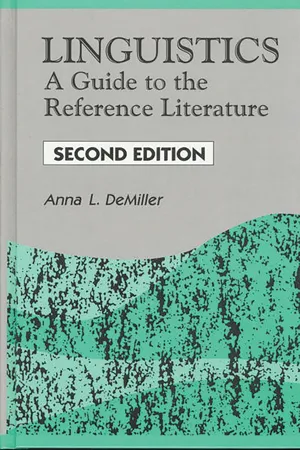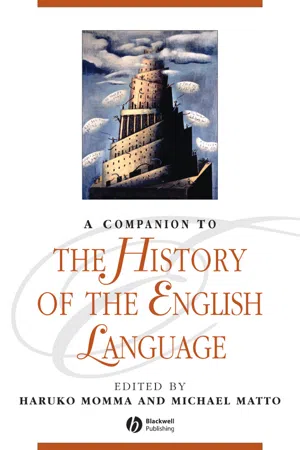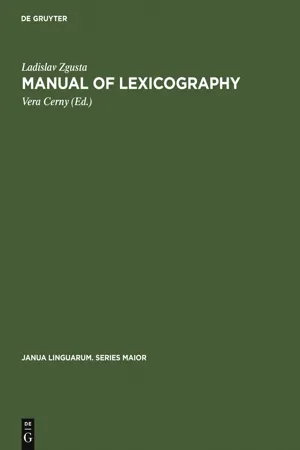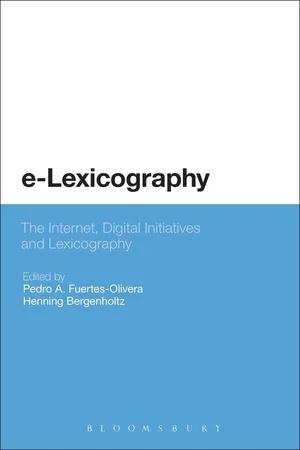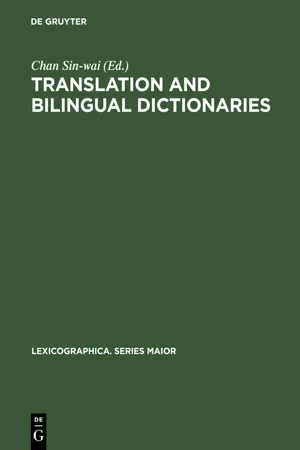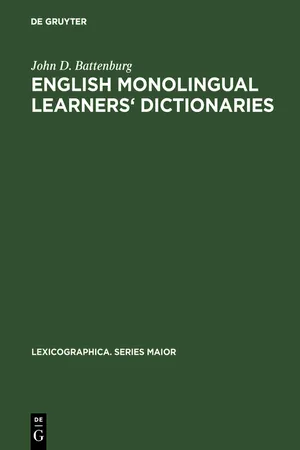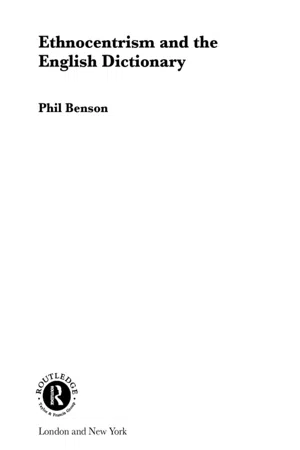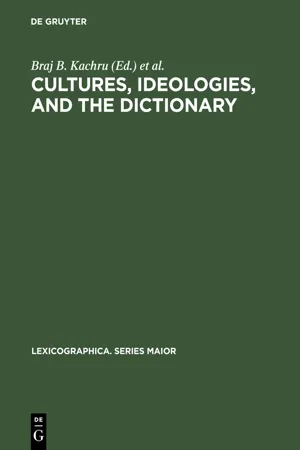Languages & Linguistics
English Dictionaries
English dictionaries are reference books that provide definitions, pronunciations, and usage of words in the English language. They also often include information on word origins, synonyms, and antonyms. English dictionaries are essential tools for language learners, writers, and anyone seeking to understand and use the English language effectively.
Written by Perlego with AI-assistance
Related key terms
1 of 5
8 Key excerpts on "English Dictionaries"
- eBook - PDF
Linguistics
A Guide to the Reference Literature
- Anna L. DeMiller(Author)
- 2000(Publication Date)
- Libraries Unlimited(Publisher)
Parti GENERAL LINGUISTICS This page intentionally left blank 1 Dictionaries, Encyclopedias, Guides, and Surveys The terms "dictionary" and "encyclopedia" have been broadly interpreted in this chapter to survey a range of reference sources variously calling themselves dictionaries, lexicons, indexes of terms, glossaries, encyclopedias, surveys, guides, and handbooks. The use of one of these words in a title, however, can be deceptive as, for example, some of the entries below call themselves dictionaries, but in reality provide no definitions, just indexes of terms. Some are hybrids, such as the encyclopedic dictionaries or the dictionaries that provide definitions, but also have indexes of terms for other languages. Works listed here range from comprehensive to narrow in scope and from highly technical to very basic. Dictionaries of just traditional grammatical terms are excluded. Monolingual reference sources may be included if in English, German, or French. Bilingual and multilingual dictionaries may be included if in one or more of the above three languages. To point the user to the best of a wide choice of dictionaries, coverage is selective and annotations point out differences among similar works. 1. Abraham, Werner. Terminologie zur neueren Linguistik. 2. vollig neu bearb. u. erw. Aufl. Tubingen: Max Niemeyer, 1988. 2v. 1059p. index, illus. bibliog. (Germanistische Arbeitshefte: Erganzungsreihe, 1; ISSN 0344-6700). ISBN 3-484-10605-0. The second edition of this already excellent dictionary for contemporary linguistics has now been considerably enlarged and brought up to date. Volume 1 is A-L; volume 2 is M-Z. Entries vary in length from a few lines to a few pages though some are as long as six pages. Head terms are alphabetically arranged with English translations of the terms often given. Many definitions are drawn from original sources, most in German, but a considerable number in English as well. - Haruko Momma, Michael Matto, Haruko Momma, Michael Matto(Authors)
- 2009(Publication Date)
- Wiley-Blackwell(Publisher)
Part III English Semantics and Lexicography Part III 91 Introduction Attempts by lexicographers to capture and give order to a language also affect its development. The three essays in Part III take up the abundance of glossaries, wordlists, dictionaries, and thesauri written to make sense of the semantic and lexical structure of English. In “Dictionaries Today” R. K. K. Hartmann offers an overview of the science of dictionary-making and of the challenges that face the modern lexicographer; Werner Hüllen’s “English Onomasiological Dictionaries and Thesauri” provides a history of early attempts to order the lexicon; and Charlotte Brewer takes a closer look at the motivations behind three landmark modern English Dictionaries in “Johnson, Webster, and the Oxford English Dictionary .” Dictionaries, Hüllen reminds us, have two primary semantic uses: to look up the meaning of an unknown word, or to find the right word to express an idea. The modern English speaker can choose from literally hundreds of dictionaries, from the smallest pocket speller to the heaviest unabridged tome, and the number will only swell as users turn increasingly to a growing number of electronic resources: spell-checkers, free online dictionaries, and user-created projects such as Wiktionary and the slang Urban Dictionary. Still, rarely do we feel the need to specify which diction-ary we cite; we instead refer simply to the authority of “the dictionary.” But a dic-tionary’s structure and purpose determine the user’s experience of it, and so of their own language. In the face of this abundance of resources, Hartmann writes of the need for a “reference science” which would encompass “the study of all aspects of organizing data, information, and knowledge” with an eye toward both the end user and the lexicographer. The desire to organize everything in God’s creation in terms of language was strong early in English’s history as well, especially during the Middle Ages.- eBook - PDF
- Ladislav Zgusta, Vera Cerny(Authors)
- 2010(Publication Date)
- De Gruyter Mouton(Publisher)
CHAPTER V THE TYPES OF DICTIONARIES 5.0 One of the best definitions I know of the term dictionary was given by C. C. Berg: 1 A dictionary is a systematically arranged list of socialized 2 linguistic forms compiled from the speech-habits of a given speech-community and commented on by the author in such a way that the qualified reader understands the meaning ... of each separate form, and is informed of the relevant facts concerning the function of that form in its community. This definition is concerned with the central types of dictionaries, i.s. with those dealing primarily with lexical meaning. The functions of the linguistic forms (i.e., in our case, words and other lexical units) and their meaning are, as we know from the preceding discussion, so multifarious and ramified that we cannot wonder that there are many different types of dictionaries. Indeed, Y. Malkiel 3 is absolutely right when saying that the word dictionary can apply quite loosely to any reference work arranged by words or names. 4 In this chapter, we shall discuss the most important types of dictionaries. 1 Report p. 4. 2 The term socialized is explained by C. C. Berg in the subsequent sentence in the following way: Linguistic forms are social facts in so far as they result from individual utterances being socialized, i.e. imitated time after time, under similar circumstances, by members of the community where they originated. In the overwhelming majority of cases, the data indicated in a dictionary are socialized forms in this sense of the word; what remains beyond the boundaries of the definition would be the indications of different occasional forms, e.g. of hapax legomena in big dictionaries. It is not necessary to loose much time pondering over such exceptions (which confirm the rule); and after all, it can be maintained that each and every hapax can potentially develop into a socialized form, i.e. - eBook - PDF
e-Lexicography
The Internet, Digital Initiatives and Lexicography
- Pedro A. Fuertes-Olivera, Henning Bergenholtz(Authors)
- 2011(Publication Date)
- Continuum(Publisher)
Examples of collaborative sections hosted on institutional dictionary sites suggest that the opposition institutional versus collective dictionary (Fuertes-Olivera, 2009b) may no longer be a sharp one. Two such examples from well-known institutional publishers are the Merriam-Webster’s Open Dictionar y 20 and Macmillan Open Dictionar y. 21 A perusal of the user-added entries reveals that most of the entries added would not meet the criteria for inclusion in the regular edition of the dictionary, and their pres-ence merely provides evidence of the conventional wisdom that ‘the diction-ary’ is a collection of ‘all the words’ of a language. Apart from adding open dictionary components, online dictionaries some-times offer other extras aimed at involving the users. Recent add-ons include social networking features, such as the award-winning Macmillan Dictionary blo g. 22 So far we have discussed general dictionaries of contemporary English, aimed at both native speakers of English and foreign learners. Let us now move beyond these common types, to diachronic and specialized dictionaries. 11.3.4. Diachronic (Historical) Dictionaries Users of diachronic dictionaries are most typically language scholars, and so their level of sophistication and language awareness is normally far beyond that of lay users. As language experts, they can reasonably be trusted to make choices that a non-expert user will not be in a position to make, such as the explicit selection of microstructural data categories (and we will revisit the issue of customization in a later part of this chapter). The makers of scholarly 238 e-Lexicography diachronic dictionaries appear to be aware of these ramifications, as exem-plified by the online version of what is perhaps the most famous dictionary world-wide (at least for English), the Oxford English Dictionary . - eBook - PDF
- Chan Sin-wai(Author)
- 2013(Publication Date)
- De Gruyter(Publisher)
In this paper, at least, I will argue that monolingual dictionaries, together with bilingual dictionaries the other way around, e.g. Language 2 to Language 1 (L2-L1) dictionaries when translating from LI into L2 and vice versa - are far the best ones to provide solutions to a number of problems frequently popping up during the translation process. 2. The Concept of the Bilingual Dictionary As the problem of the usefulness of bilingual dictionaries for translation purposes has already been raised, this and the following section will deal with the concepts of bilingual dictionaries and translation dictionaries in order to clarify up to what point a bilingual dictionary is a translation dictionary and whether a translation dictionary is always a bilingual dictionary. In order to discuss these questions, four dictionaries of lexicography published during the last seven years have been consulted. The dictionaries are: • Diccionario de lexicografia práctica (de Sousa 1995) • Nordisk leksikografisk ordbok (Bergenholtz et al. 1997) • Dictionary of Lexicography (Hartmann and James 1998) • Lexicography. A Dictionary of Basic Terminology (Burkhanov 1998) 24 Sven Tarp The first of these dictionaries is Spanish; the second is Norwegian and the result of a joint Nordic project, while the two remaining are English. I have translated the quotations from the two former dictionaries. Under the lemma bilingual dictionary de Sousa (1995: 129) provides the following short definition: Plurilingual dictionary that registers the equivalencies of the meanings in two languages. Such a short definition of a complex reality is always a problem, as it tends to exclude a number of important characteristics. Especially the expression equivalencies of the meanings in two languages could lead to the conclusion that we are dealing with a two-way dictionary. - eBook - PDF
- John D. Battenburg(Author)
- 2017(Publication Date)
- De Gruyter Mouton(Publisher)
Herbst and Stein note that dictionary training has been discouraged within second and foreign language classrooms because of the communicative emphasis; however, they recommend that dictionary use be taught and practiced in language classes because users need to be shown how to apply a variety of reference skills. They express the hope that eventually students should also develop a feeling for possible mistakes in order to know when they should consult a dictionary (122). Snell-Hornby (1987) found that the 35 EFL students she surveyed at various Swiss universities used both monolingual and bilingual dictionaries daily. As with other studies, dictionaries were primarily employed for information concerning meaning. These texts were also consulted for usage and translation, and for grammatical and pronunciation assistance. Concerning attitudes towards the dictionary, Snell-Hornby notes that the dictionary was expected to be an inexhaustible fund of information requiring the minimum in cost and effort from the user (167, 168). Within the dictionary, students wanted information such as modern, technical terms, American and British variants, usage notes, collocational material, antonyms and synonyms, and encyclopedic information--all in a small and inexpensive volume. Iqbal 1 s (1987) exhaustive examination of 700 Pakistani advanced learners of English is the most relevant study cited here because particular attention was paid to English MLDs. The 54-item questionnaire dealt with six areas: reference skills, general language needs, meaning of lexical items, syntactic information, pronunciation, dictionary evaluation. In addition to surveying these second year college students, Iqbal also interviewed 25 English teachers to determine how effectively English MLDs served the needs of their pupils. He found that although a large majority of students owned monolingual dictionaries, many were unaware of the distinction between general monolingual works and MLDs. - eBook - ePub
- Phil Benson(Author)
- 2002(Publication Date)
- Routledge(Publisher)
1 Dictionaries and theories of language
The argument that English Dictionaries are fundamentally ethnocentric rests on a view of the English dictionary as a representation of the English language organised in terms of metaphors of centre and periphery. The process of lexicographical representation, constrained by the rules and principles of lexicographical practice, leads not to the production of a direct reflection of the language ‘as it is’, but to the production of a version of the language, with definite form and shape. This version of the language both represents and conditions our conceptions of what the language is, what it is made of and the ways in which its component parts are related to each other.The notion of the dictionary as representation implies a theory of the dictionary based upon theories of semiotics, ideology and discourse that will be outlined in more detail in Chapters 2 and 3. First, however, it has to be acknowledged that dictionary-makers themselves do not typically view lexicography as a process of representation. For most modern lexicographers, lexicography is first and foremost a process of description and the rules and principles of lexicographical practice constrain the lexicographer to ‘accuracy’ and ‘objectivity’. Moreover, twentieth-century descriptivist lexicography defines itself as a response to the prescriptivist lexicography of earlier centuries. In contrast to the prescriptive lexicographer, who relies on intuition and arbitrary diktat, the descriptive lexicographer relies on evidence. In this sense, descriptivism is crucial to the self-image of modern lexicography as an endeavour in harmony with principles of scientific inquiry. We begin, therefore, by examining the nature of the assumptions on which descriptivist lexicography is based and their relationship to evolving theories of language. - eBook - PDF
Cultures, Ideologies, and the Dictionary
Studies in Honor of Ladislav Zgusta
- Braj B. Kachru, Henry Kahane, Braj B. Kachru, Henry Kahane(Authors)
- 2013(Publication Date)
- De Gruyter(Publisher)
What does develop, however, is a feeling of disenchantment with dictionaries and a disinclination to use them that is frequently, sometimes permanently, acted upon. There remain, however, three major dilemmas. Firstly, lexicographers are called on to help the users of their products: this means that they must enlighten their users without appearing to instruct them. The self-same entries must be formulated so that they can either harmoniously trigger off knowledge already pre-existing in the user's brain or implant new knowledge there. Secondly, ways need to be found to blur the principle that dictionaries are supposed to contain information about words rather than about things. Thirdly, most people who use dictionaries, learners partially excepted, want to find out what a word means rather than how to use it. We need to devote more thought to this crux, not least by pursuing the issue well beyond the utilitarian level to which most treatments are still Dictionaries for the People or for People? 319 confined. Knowing how to use a word inevitably involves the world of grammar, syntax and style and such needs cannot be ignored by dictionary-makers even though they are catered for by others too. The point is that seeking a word's meaning in a dictionary is tantamount to verifying what others have taken its meaning(s) to be, authors in vivo and lexicographers in vitro. In like manner, using a dictionary to find out how a word is used is merely to view how others—this time only authors and not lexicographers!—have used it before. It is unfortunately possible to equate prototypicality of use with stereotypicality and squeeze out any elasticity in the process. Some implications emerge from these considerations for general purpose dictionary microstructures.
Index pages curate the most relevant extracts from our library of academic textbooks. They’ve been created using an in-house natural language model (NLM), each adding context and meaning to key research topics.
